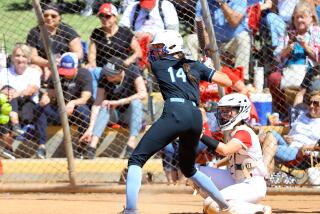In a Fog
- Share via
Stitches mended the wound on Lesley Fulton’s forehead but did nothing to heal the hurt inside, an injury that left her struggling for the right word and feeling overwhelmed while counting change at the cashier.
Two years ago, Fulton was team captain and star shortstop for the Miami of Ohio softball team, playing alongside her twin sister, Laura, the second baseman.
Then came a game in Florida and a violent collision that left her unconscious. That was followed, over the course of a year, by a succession of smaller jolts on the playing field that took a toll on her senses.
Fulton, 22, now owns two wallets, two sets of keys and two driver’s licenses because she struggles to keep track of the most common necessities. Post-concussion syndrome has left its mark.
In January, Fulton bought a camera, hoping pictures will help keep her memories alive. “A visual helps me,” she says. “I have no pictures of my college experience. Not having memories of college, which are supposed to be the best years of your life, that’s hard to swallow. I can’t remember playing softball. Four years--gone.”
This is what doctors feared for quarterbacks Troy Aikman and Steve Young, both of whom had a series of concussions.
If either of those former NFL stars wonder what his life might be like had he suffered one concussion too many, Fulton can tell them. So can her classmates in the Acquired Brain Injury program at Coastline Community College in Costa Mesa.
Coastline’s program, which is considered among the best of its kind in the nation, offers cognitive retraining to brain-injured adults; in Lesley’s case, she suffered confusion, disorientation, light sensitivity, lack of insight and organization, and word-finding difficulties. More than 700,000 Americans annually sustain brain damage from traumatic head injuries, according to the Brain Injury Assn., and Lesley’s was not as severe as many of those with whom she graduated last week.
“Brain injury is a hidden disability,” said Tracy Goldberg, an instructor at Coastline since 1987. “On one hand, they appear like you and I, but there are so many subtle deficits that prohibit them from being gainfully employed and having successful relationships.”
Fulton, along with being a college scholarship-winning athlete, was a National Honor Society student at Rosary High. But she wasn’t made of steel, and after she and a teammate collided head-to-head while diving for a fly ball, her life started spinning like a carnival Tilt-A-Whirl.
She was unconscious on the field for about two minutes and given medication for the pain at a hospital emergency room. Back in Ohio, with black eyes and a swollen face, a brain scan came back normal. Still, she had severe headaches, was sensitive to light and suffered short-term memory loss. She also slept as many as 20 hours a day.
Fulton missed about a month of the 1999 season before returning to the lineup. When her physical appearance got better and the headaches became shorter, she thought she was healed. But at shortstop Fulton was often involved in collisions with opposing players sliding into her.
Toward the end of the summer, Lesley relapsed, sleeping 20 hours a day--abnormal even for someone who years earlier had been diagnosed with chronic fatigue syndrome. She returned to the Miami campus in the fall of 1999, and she played some of the best ball of her career during the off-season fall schedule. She was batting more than .500 and playing superb defense when she was involved in another violent collision, this time with a player from the University of Ohio.
Headaches and dizziness returned, but all seemed normal by Christmas and she was back on the field for the opening of the 2000 season in February.
Before a tournament game at Middle Tennessee State, Laura Fulton said she noticed something wrong with her sister and told a coach and trainer that Lesley shouldn’t be in the lineup. Nevertheless, Lesley started and had one of the best games of her career. She had hits in her first two at-bats and drove in a career-high four runs. She also became increasingly unresponsive and inarticulate. She was unable to recall the color of the opposing team’s uniform or whether her team had won or lost its previous game. After only three innings, Fulton took herself out of the game.
She hasn’t played competitively since.
Fulton, a Times All-Orange County player in high school, has taken up golf to quench her competitive thirst. “My days of team sports, contact sports, are over,” she said. Fulton also began giving individual instruction in softball to about six girls ages 8-12.
On the field, she becomes emotive, articulate, inspiring.
A year ago, she would not have been able to give these lessons. “Last summer, I was so out of it,” Fulton said. “I had no idea what was going on because I couldn’t think back to yesterday.”
Even now, it is a rare day that she starts a conversation that involves her past. She was pursuing a degree in sociology with an emphasis in criminology, but her hopes of a career in law enforcement are mostly over. She is considering forest service. Or coaching.
“It became apparent to me that she was ready [to leave the Acquired Brain Injury program] when she initiated her own transitional plan,” said Goldberg, Fulton’s instructor. “It’s not common for our students to say, ‘This is what I want to do and this is how I want to do it.’ ”
She still needs 48 units to graduate from college, and will return to Miami of Ohio in the fall and take two classes. Her softball scholarship is expected to be switched to a medical hardship, and her hope is to have her degree within two years. She recently completed an anthropology class at Golden West College, and got an A on a test, a B in the class.
“I thought I had it all figured out with my career, but not anymore,” Lesley said. “I’m not quite as independent as I want.”
Fulton has been living with her parents, George and Linda, and her younger brother, Robert, 15, for the last 18 months. “It’s bittersweet,” George Fulton says. “I’m much closer to her now than I ever was when she was playing softball.”
Every member of Fulton’s family has gone to an ABI class with her. Lesley’s oldest brother, James, 19, who attends the University of San Diego, was moved by what he had seen. “He told me, ‘Mom, I’m going to slow down when I drive,’ ” said his mother, Linda.
Goldberg said Fulton was helped in her recovery by her sports background. “Because of her determinism, her athleticism, her intrinsic motivation--she’s a self-starter--she was able to make many gains in her cognitive rehabilitation process,” Goldberg said. “A lot of people with brain injuries have problems getting started.”
But Fulton’s one regret involves finishing. “I never had a last [softball] game, because I don’t remember it,” she says. “There was no closure.”
She does not expect to remember that final game, either. Nor does she expect to regain normal brain function. But she is prepared to make new memories. “If it gets better, great,” she says. “If not, I’m ready to deal with it.”
More to Read
Go beyond the scoreboard
Get the latest on L.A.'s teams in the daily Sports Report newsletter.
You may occasionally receive promotional content from the Los Angeles Times.










